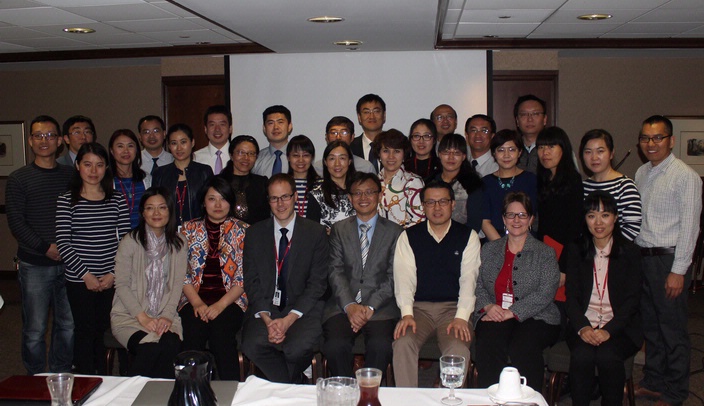On March 21 the second group of China Scholarship Council Faculty Medical Education Trainees completed their training at UNMC. The group was on campus for three months observing courses and meeting with UNMC faculty.
The CSC faculty group was comprised of educators from the Midwest region of China. In this large region of China, opportunities for pedagogical training are scarce compared with the large cities to the east. The CSC faculty members come from Kunming City (Yunnan Province); Kaifeng City, Zhengzhou City, and Xianxiang City (all in Henan Province); Urumqi City and Shihezi City (Xianjiang Uyghur Autonomous Region); Yinchuan City (Ningxia Hui Autonomous Region); and Xi’an City and Xianyang City (Shaanxi Province). Nebraska is in the process of developing a sister state relationship with Shaanxi Province.
The CSC faculty group was impressed by the fact that UNMC is highly ranked in the field of family medicine education, but that faculty members here constantly strive to improve medical education. “This makes UNMC an ideal place for us to learn,” said Yanjun Lei, a specialist in immunology and virology from Xi’an Jiaotong University Health Science Center.
The group mentioned four elements of UNMC’s medical education that stood out. One was the high standard and high level of standardization of education. Another was UNMC’s integrated curriculum that breaks down the barriers between basic and clinical science. The third was practice students receive in how to interact with patients. The fourth was the degree of interprofessional educational experiences, which help future doctors learn how to work with other health professionals in the care of a patient. “Teams make better decisions,” said Guzhanuer Abuduxikuer, a lecturer in OBGYN from Xinjiang Medical University.
The group members said that they want to begin implementing these changes to medical education at their home institutions if possible. It will not be an easy job, however. One issue is practical. Participants said that though they want to integrate active learning in their encounters with medical students, it is difficult to do in large classes. One participant said that his anatomy class can have upwards of 300 people in it, so it is impossible for all of his students to do problem-based learning. Gerald Moore, M.D., Senior Associate Dean of the College of Medicine, suggested using online teaching tools in situations such as this.
Another difficulty these participants will face is how to maintain their desire to implement these changes even after they have left UNMC. Jialin Zheng, M.D., Director of the Asia Pacific Rim Development Program, said that he meets faculty who have gone through UNMC’s program at different times after they finish their training: “Soon after returning to China, these faculty have a strong desire to make changes in the education system at their universities. When I meet with them a few months later, their desire has diminished. Please keep your drive and you can help improve medical education in China.”
He continued, “The goal of this program is to train the trainers. You are now ambassadors of UNMC’s educational techniques. We can work together to make better physicians in China, the U.S., and the world.”
